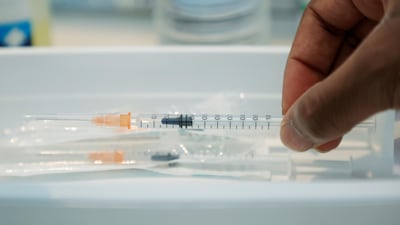Pfizer and BioNTech have asked the US health regulator to relax requirements for their Covid-19 vaccine, so that instead of being stored at ultra-low temperatures, it could be kept in pharmacy freezers, the companies said on Friday.
Approval by the Food and Drug Administration could send a strong signal to other regulators around the world that may ease distribution of the shot in poor countries.
The companies have submitted new temperature data to the agency to support an update to the current label that would allow vials to be stored at minus 25 to minus 15°C (minus 13°F to 5°F) for a total of two weeks.
The current label requires the vaccine to be stored at temperatures between minus 80ºC and minus 60ºC (minus 112ºF to minus 76ºF), meaning it has to be shipped in specially designed containers.
The shot's cold-storage requirements set off a scramble among US states at the beginning of the vaccination programme for dry ice, which can be used temporarily when there are no specialised freezers available.
Pfizer-BioNTech's vaccine, along with Moderna's two-dose shot, has already won US emergency-use authorisation and is being widely distributed as part of the country's mass vaccination efforts.
The update from the drugmakers comes as two studies from Israel found that the vaccine greatly reduced virus transmission, and the shot was backed by two of the South African government's top advisers.
The new data will also be submitted to global regulatory agencies within the next few weeks, the two companies said.
A BioNTech spokeswoman declined to provide more details on the timing and which agencies would be contacted.
"The data submitted may facilitate the handling of our vaccine in pharmacies and provide vaccination centres an even greater flexibility," BioNTech chief executive Ugur Sahin said.
Deutsche Post, which has shipped Covid-19 vaccines to several European countries, Israel, Bahrain, Mexico and Singapore, among others, said minus 25 degrees would provide some relief but transportation would still not be easy.
A spokeswoman said air freight would likely no longer require dry ice on board, increasing storage capacity per plane.
BioNTech has said it imposed long-term storage and transportation requirements of minus 70 degrees out of caution because it had started stability and durability tests on its vaccine relatively late.
Even though it launched its Covid-19 vaccine development programme as early as January 2020, working on four compounds in parallel, it did not decide until July which of the four to proceed with, and only then started stability tests.
If approved, the less onerous storage requirements would provide significant logistical relief for the distribution of the vaccine worldwide, particularly in poor countries.
The World Health Organisation's Covax global vaccine-sharing programme has so far limited distribution of Pfizer-BioNTech vaccines to a few countries, partly out of concern over a lack of infrastructure in developing nations.
The WHO said it was hopeful that eased requirements could broaden its reach.
"We are aware of reports of this and look forward to seeing the data. If proven correct, this could make roll-out of the vaccine easier in all countries, and particularly in low-income ones," it said.
Moderna's product, which like Pfizer's is based on so-called messenger RNA molecules, is already cleared for storage at minus 25 to minus 15ºC

